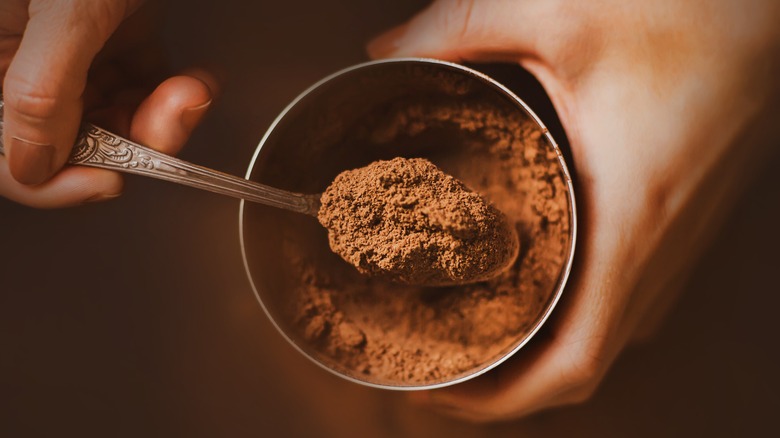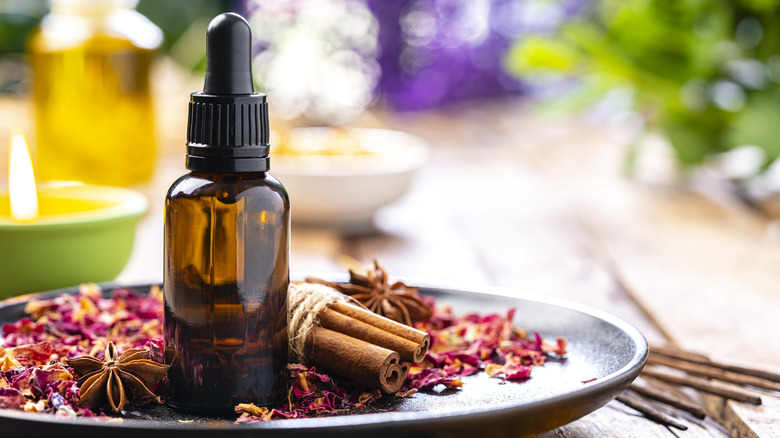How To Use Cinnamon While Vacuuming To Keep Your Home Smelling Fresh
Vacuuming your floors is an easy way to help eliminate unwanted odors from inside your home, but you may need to take your cleaning routine to the next level in order to leave a lasting impression on your residents and guests. Foul odors can develop from a variety of substances. Pet hair, dust, and mold, for example, can all contribute to your home's interior smelling musty and unpleasant. Luckily, one kitchen ingredient is capable of eliminating tough odors in the air while enveloping your home in a comforting aroma. Cinnamon is a common sight and scent during the holiday season, but you don't have to wait until Christmas to whip out the sweet-smelling spice. You can use cinnamon in its powder form or as an essential oil when vacuuming to release a pleasant aroma throughout the rooms of your home.
Cinnamon doesn't just smell warm and earthy, the spice comes with many health benefits that greatly benefit those who use it. First, ingesting cinnamon is proven to aid digestion, keep blood sugar levels low, and fend off bad breath. The spice is also loaded with antioxidants that fight against an array of complications, including neurodegenerative diseases and even cancer. Though, you don't even need to eat cinnamon in order to benefit from its advantages. In fact, merely smelling cinnamon may improve memory, combat drowsiness, and reduce the frequency and intensity of headaches. Here's how to use cinnamon in two forms to make your house smell sweet and fresh.
Using cinnamon powder
It can be fun to find new ways to repurpose the products already lying around your house. So, you may find it fortunate that the leftover cinnamon sitting in your pantry or kitchen cabinet from the holidays can be put to further use. The classic hack is to sprinkle a bit of ground-up cinnamon directly onto your floor before running your vacuum cleaner over it to release the spice's scent throughout the room.
You can also create your own fragrant cleaning solution by mixing Borax, baking soda, and ground cinnamon into a bowl and sprinkling the product onto your floor. Give the mixture about 20 minutes to settle before vacuuming. Though the cinnamon residue will be absorbed by the vacuum, the warmth from the appliance will activate the oils within the powder, which will spread throughout your home as you continue to work.
Doing so will not only deodorize the room, but it will also help freshen your vacuum cleaner. Vacuums will sometimes emit an unpleasant smell when used if homeowners wait too long before cleaning them. Accumulated dirt and festering mold can lead to a stinky vacuum over time. Clean your vacuum filter or other internal compartments by gently removing built-up dirt, dust, or pet hair, followed by implementing the cinnamon hack. The spice will help freshen your vacuum filter after the appliance sucks it up.
Using cinnamon-scented essential oils
If you don't have cinnamon powder on hand to sprinkle onto your floors, try adding a few drops of a cinnamon-scented essential oil instead. Cinnamon essential oil offers many physical benefits to its users, given its antibacterial, antidepressant, antiviral, and anti-inflammatory properties. So, this simple trick has the potential to promote cognitive and immune health among your house's residents, on top of making your home smell warm and sweet.
You can either drop the essential oil directly into your vacuum's filter or into its bag. Similar to cinnamon powder, the heat from your vacuum will activate the oil, releasing a fragrant aroma around the room that you're cleaning. Another option is to place a few drops of your ideal essential oil onto a cotton ball and toss it inside your vacuum's dust cup if it has one. These methods can cause your vacuum to release this scent over the course of its next several cleans.
It's important to note that you should make sure the essential oil used hasn't expired before using it to clean, as this may impose health risks if inhaled or ingested. As well, prolonged exposure to heat, light, and oxygen can lead to essential oils expiring faster.



